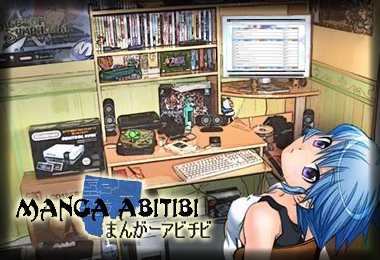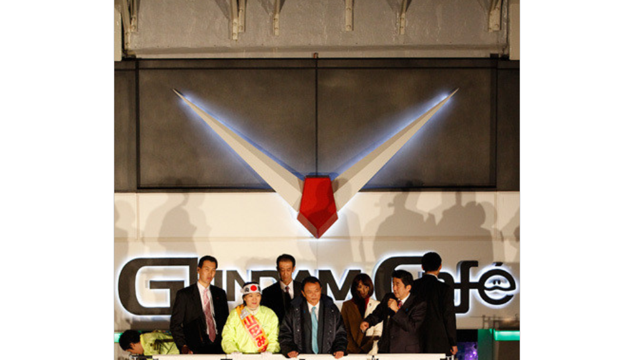Quand on retrouve des ''tropes'' (clicher) de manga dans les campagne politique au japon!
Manga Abitibi :: Japon :: Actualité
Page 1 sur 1
 Quand on retrouve des ''tropes'' (clicher) de manga dans les campagne politique au japon!
Quand on retrouve des ''tropes'' (clicher) de manga dans les campagne politique au japon!
Pour ceux qui n'aurais pas tomber sur l'actualité du japon..... les japonais on eu il y a 2 semaine environs une élection national de leur gouvernement. Avec la popularité du monde otaku et tous les fameux ''tropes'' que on retrouve maintenant dans la vie de tout les jours qui nous sont influencer par ceux-ci.... ne soyons pas étonner que des politiciens n'oserais pas en utiliser pour mousser leur campagne et attirer des électeurs.
voici une série de poster de campagne électoral qui au lieu d'avoir la binette plate et ordinaire du politicien comme nous même on peut avoir ici..... notre montre en ''stop motion'' sont arriver dans la politique.
A chaque jour de la campagne.... un poster différent était afficher ici sur se mur d'un commerce.
voici l'article qui réfère le fait.
un jour on va surement voir un politicien nous faire un kamehameha ou un bankai!!!!!
Sinon si vous penser que les politicien ne se souci pas des otaku ou des ''geek''.... et bien détromper vous.... voici un autre article qui parle du sentiment de nationalité des japonais (qui est un sujet sensible pour eux). Étrangement une bonne partie des japonais ne sont pas aussi patriotique de leur drapeau et de leur pays... liant se symbole a leur honneur perdu de la deuxième guerre mondial..... ca parais peut-être loins pour nous qui somme jeune.....mais il faut y penser que c'est un événement qui n'a même pas encore 100 ans.... pour un pays plusieurs fois centenaire.... c'est compréhensible que beaucoup d'entre eux se sente encore affecter et que le symbole de leur drapeau leur rappel un certains pincement au coeur.
Mais somme toutes..... les moeurs change et le future appartient au nouvelle génération... et une bonne partie d'entre eux sont des otakus!!! vive le quartier akihabara!!

voici une série de poster de campagne électoral qui au lieu d'avoir la binette plate et ordinaire du politicien comme nous même on peut avoir ici..... notre montre en ''stop motion'' sont arriver dans la politique.
A chaque jour de la campagne.... un poster différent était afficher ici sur se mur d'un commerce.
voici l'article qui réfère le fait.
Japan is holding a national election on December 16. No, wait! Don't stop reading, because one politician just did something so very cool. It's more a like manga-inspired art project than your typical politics.
Before the election, boring posters of politicians go up across Japan. The posters feature headshots, and like I said, they are so boring. The photos, the design, and the poses all look the same.
Not this series of posters from Toru Watanabe, who is running as a member of the Japan Restoration Party for the Tokyo fifth district.
Starting on December 4, a Watanabe poster appeared on a local pharmacy. The tagline refers to "running through" the Japan Restoration Party's path. And each day, a new poster with a new photo appeared and seemed to take that tagline literally.
Full size
Full size
Full size
Full size
Full size
Full size
Full size
Full size
Full size
The stop motion photos and manga style speed effects work brilliantly. Who said Japanese politics was dull?
un jour on va surement voir un politicien nous faire un kamehameha ou un bankai!!!!!
Sinon si vous penser que les politicien ne se souci pas des otaku ou des ''geek''.... et bien détromper vous.... voici un autre article qui parle du sentiment de nationalité des japonais (qui est un sujet sensible pour eux). Étrangement une bonne partie des japonais ne sont pas aussi patriotique de leur drapeau et de leur pays... liant se symbole a leur honneur perdu de la deuxième guerre mondial..... ca parais peut-être loins pour nous qui somme jeune.....mais il faut y penser que c'est un événement qui n'a même pas encore 100 ans.... pour un pays plusieurs fois centenaire.... c'est compréhensible que beaucoup d'entre eux se sente encore affecter et que le symbole de leur drapeau leur rappel un certains pincement au coeur.
Mais somme toutes..... les moeurs change et le future appartient au nouvelle génération... et une bonne partie d'entre eux sont des otakus!!! vive le quartier akihabara!!

On the eve of an election, a politician stood before a crowd. The speech was fiery. And flags fluttered. If this were anywhere else, nobody would think twice. But this wasn't anywhere. It was Tokyo.
Akihabara to be exact. Former Prime Minister Shinzo Abe lead his conservative Liberal Democratic Party to a huge victory yesterday, bring him back to power.
On December 15, Abe made a last minute speech in Akihabara, Japan's geek district. He spoke from a van in front of the Gundam Cafe. Next door, the neon lights for idol group AKB48's restaurant burned. A crowd of one to two thousand gathered to listen to Abe speak. It's not uncommon for large crowds to gather and listen to politicians in Japan.
What is uncommon is widespread flag waving, even at campaign speeches. At events like this, rallying around the flag brings up memories of World War II—not just for people outside Japan, but people in the country. This is compounded by Abe's desire to change Japan's Constitution, which says that Japan can have a self-defense force, so it could have a more assertive military. (Other things he wants to do is jump-start the economy, keep nuclear power, address the bullying problem in schools, and end the country's crippling deflation.)
"This is so unsettling", wrote one user on 2ch, Japan's largest bulletin board. "This is scary," wrote another. "The hell are these people doing," added yet another. "I really cannot comprehend."
Another said only left wingers equated the Japanese flag with war. Some even pointed out how during foreign elections—whether that's America, France, England or wherever—numerous people wave their country's flag. "Ha, so it's only strange for Japan," quipped one commenter.
"It's bizarre to hate your own country's flag," wrote another commenter. "It's normal to be proud of one's country. The only ones who hate the Japanese flag are Koreans living in Japan."
Even in Japan, the concern that some have is that strong patriotism brought all sorts of hardship onto Japan and the rest of the world. And as those who experienced those hardships during the war continue to pass away, there are fewer reminders of just how bad things got. The war left such a bad taste in enough people's mouths that even today such public displays of nationalism can make people in Japan uneasy. Some Japanese don't even like singing the national anthem or the flag because they are reminders of Japan's military past.
There could be different explanations for this recent display of nationalism in Akihabara. On Twitter, some individuals even worried if these flag wavers were (偽客), or plants—you know, faux flag wavers. Or perhaps, a right wing group passed them out to people at the rally. Even if they were phonies, the landslide victory on December 16 was very real.

Neosilver-

Nombre de messages : 2662
Age : 44
Ville : Rouyn-Noranda
Emploi/loisirs : TI Réseau
Mon Top 3 Anime/manga : il y en a trop et ca change tout le temps
Date d'inscription : 31/08/2012
 Re: Quand on retrouve des ''tropes'' (clicher) de manga dans les campagne politique au japon!
Re: Quand on retrouve des ''tropes'' (clicher) de manga dans les campagne politique au japon!
Je me suis dis que ce serais bien de continuer sur un peu de politique.... cela fessais un peu de temps que j'en avais pas parler.
Pour faire suite au changement survenue que j'ai parler dans le post plus haut. Bon, savez que le japon est dans un gouffre économique depuis un bon nombre de temps et le changement de gouvernement qui a occuré veulent s'y attaquer.
Peut-être certain d'entre nous dirais que la politique n'a rien a voir avec le monde otaku...mais d'un autre côté, cette univers est lié très prochement a l'économie du pays et a la politique qui s'y passe la bas.
Alors pour ceux qui sont intéresser par l'actualité du pays c'est dernier temps..cette article vous intéressera peut-être.
Un fais que je remarque et qui est mentionner aussi dans l'article... peut importe le pays ou on vie, le problème de vieillissement de la population et du coup que les vieux engendre reste le même.
peut-importe l'age... une esprit créatif reste toujours un trésor, on devrais tous les transformer en mangaka.
Pour faire suite au changement survenue que j'ai parler dans le post plus haut. Bon, savez que le japon est dans un gouffre économique depuis un bon nombre de temps et le changement de gouvernement qui a occuré veulent s'y attaquer.
Peut-être certain d'entre nous dirais que la politique n'a rien a voir avec le monde otaku...mais d'un autre côté, cette univers est lié très prochement a l'économie du pays et a la politique qui s'y passe la bas.
Alors pour ceux qui sont intéresser par l'actualité du pays c'est dernier temps..cette article vous intéressera peut-être.
Un fais que je remarque et qui est mentionner aussi dans l'article... peut importe le pays ou on vie, le problème de vieillissement de la population et du coup que les vieux engendre reste le même.
peut-importe l'age... une esprit créatif reste toujours un trésor, on devrais tous les transformer en mangaka.
Japan's new right-wing government hasn't wasted time in alienating
tens of millions of its voters. According to finance minister Taro Aso,
elderly people should "hurry up and die" so that pressure can be relieved on the state to pay for their skyrocketing medical bills. Indeed,
nearly a quarter of Japan's population is over 60, so the government is
starting to feel the strain. But given the potential for more advanced
life extension technologies and even longer lives, it's
something that governments — and voters — are going to have get used to.
Anything less would be utterly discriminatory.
Aso made the
statement Monday during a meeting of a national council looking at
changes to social security. He also referred to seniors who are unable
to feed themselves as "tube people." The Guardian reports:
Full size CostThis
CostThis
aside, caring for the elderly is a major challenge for Japan's
stretched social services. According to a report this week, the number
of households receiving welfare, which include family members aged 65 or
over, stood at more than 678,000, or about 40% of the total. The
country is also tackling a rise in the number of people who die alone,
most of whom are elderly. In 2010, 4.6 million elderly people lived
alone, and the number who died at home soared 61% between 2003 and 2010,
from 1,364 to 2,194, according to the bureau of social welfare and
public health in Tokyo.
The government is planning to reduce
welfare expenditure in its next budget, due to go into force this April,
with details of the cuts expected within days.
Aso, who has a
propensity for verbal blunders, later attempted to clarify his comments.
He acknowledged his language had been "inappropriate" in a public forum
and insisted he was talking only about his personal preference.
"clarification" aside, the finance minister is evidently reacting to
not just current fiscal realities, but to estimates predicting that over
40% of the Japanese population will be over 60 in the next 50 years.
Clearly,
the aging population is placing a tremendous strain on the government,
both in Japan and elsewhere. But that's no excuse for such agist and
callous comments. The elderly population is being treated as second
class citizens, and as a kind of regrettable reality that the state is
forced to deal with.
Such sentiments are unacceptable and
completely undemocratic. But what's even more troubling is the potential
for this kind of discrimination to get even worse. We are at the dawn
of the second wave of life extension, where human longevity is set to
increase even more dramatically. Wishing that elderly people would just
"hurry up and die" is not a vision for the future. It's a myopic
perspective that will only exacerbate the resentment young people feel
towards the older generations — generations who have the right to life
and unhindered access to medical technologies.
Rather than bemoan
the presence of an increasingly aged population, governments need to
own up to what's happening. It's clearly going to be a monumental
challenge, but simply hoping that people will quickly die so that they
don't have to figure this all out is clearly not the way to go.

Neosilver-

Nombre de messages : 2662
Age : 44
Ville : Rouyn-Noranda
Emploi/loisirs : TI Réseau
Mon Top 3 Anime/manga : il y en a trop et ca change tout le temps
Date d'inscription : 31/08/2012
 Sujets similaires
Sujets similaires» [Journal]Pourquoi le Japon restera toujours le pays #1 dans l'anime et le manga
» [Politique]Le Japon et les armes a feu : l'un des pays les plus stricte en terme de lois
» [Manga]A quoi ressemble un manga au japon
» [Politique]Le Japon et les armes a feu : l'un des pays les plus stricte en terme de lois
» [Manga]A quoi ressemble un manga au japon
Manga Abitibi :: Japon :: Actualité
Page 1 sur 1
Permission de ce forum:
Vous ne pouvez pas répondre aux sujets dans ce forum












